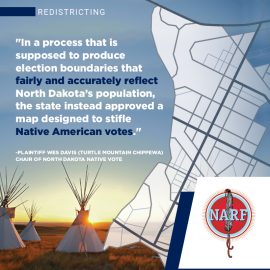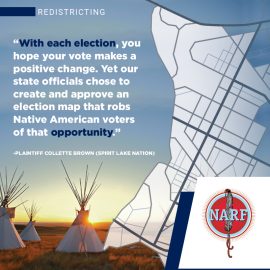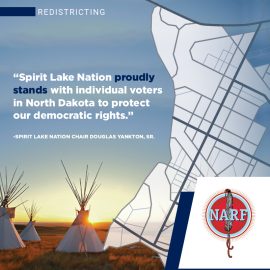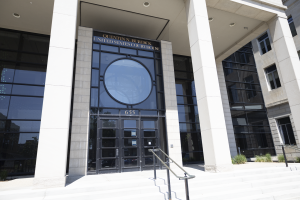In February 2022, the Spirit Lake Tribe, the Turtle Mountain Band of Chippewa, and several individual voters filed a lawsuit challenging North Dakota’s state legislative map, as unlawfully diluting the voting rights of Native Americans in violation of Section 2 of the Voting Rights Act (VRA). On November 17, 2023, the U.S. District Court for the District of North Dakota determined that districts 9 and 15 in the 2021 legislative district map are not legal under the VRA. After North Dakota did not meet the court’s deadline to adopt a legal legislative district map, the court ordered the implementation of the same map proposed by the two tribal nations to the state legislature during the 2021 redistricting process.
Background

As an initial step of the democratic voting process, the U.S. conducts a national census every 10 years. As soon as the U.S. Census releases new population estimates, states begin a process to update election district map boundaries to reflect changes in populations. Fair districting empowers Native communities to have appropriate resources and representation alongside fellow voters. The new district boundaries remain in place for the next decade and must comply with criteria outlined in the VRA.
“Instead of creating fair boundaries as outlined in the Voting Rights Act, the map adopted by the North Dakota Legislature in 2021 silences Native American voters on every issue, lowers the chance Native voters could elect a candidate they feel best represents their community, and prevents communities in these splintered districts from receiving a fair share of public resources,” said Spirit Lake Tribe Chair Douglas Yankton, Sr.
While citizens of American Indian tribes have had the right to vote in U.S. elections since 1924, Native people have had to fight the state of North Dakota for their right to vote ever since. The state of North Dakota, for example, passed laws and enacted policies that made it impossible for Native voters to participate in elections until 1958.
Throughout the redistricting process after the 2020 Census, the North Dakota legislature’s redistricting committee refused to hold public meetings on or near reservations and ignored testimony from tribal leaders. “Chairman Yankton and myself both testified before the legislature’s redistricting committee that Turtle Mountain and Spirit Lake should be drawn into the same district, and that the committee’s redistricting plan would violate federal law by diluting the Native American vote. The legislature chose to ignore our concerns and decided to adopt an illegal map,” said Turtle Mountain Band of Chippewa Chair Jamie Azure.

In November 2021, North Dakota Governor Doug Burgum signed into law H.B. 1504, redrawing state legislative districts to account for population shifts captured by the 2020 Census. The new redistricting plan simultaneously packs a supermajority of Turtle Mountain Band of Chippewa Indians citizens into a single house subdistrict, District 9A, and cracks other Turtle Mountain citizens into House Subdistrict 9B and Spirit Lake citizens into House District 15. Previously, Native American voters in northeastern North Dakota had the opportunity to elect two candidates of choice to the state house. Under the new plan, the opportunity to elect candidates to the state house is reduced to one district in the region.
“In a process that is supposed to produce election boundaries that fairly and accurately reflect North Dakota’s population, the state instead approved a map designed to stifle Native American votes,” said plaintiff and Chair of North Dakota Native Vote Wes Davis (Turtle Mountain Chippewa).
By using the redistricting process to reduce the number of state representatives in places with a large Native American population, North Dakota continues a tradition of attempting to suppress Native voters. “North Dakota created a map that guarantees voters living on these two tribal reservations face a no-win scenario before each election even begins,” said plaintiff Zachery S. King (Turtle Mountain Chippewa).
“With each election, you hope your vote makes a positive change. Yet our state officials chose to create and approve an election map that robs Native American voters of that opportunity. We need to win this lawsuit because North Dakota is not above the laws that protect our democracy from exactly this kind of voter discrimination,” said plaintiff Collette Brown (Spirit Lake Tribe), who intends to exercise her right to vote in 2022.
The Litigation
February 2022: Tribes and Voters File Lawsuit Challenging North Dakota’s State Legislative Redistricting Plan

On behalf of the Turtle Mountain Band of Chippewa, the Spirit Lake Tribe, and the individual voters, attorneys filed Turtle Mountain Band of Chippewa Indians v. Alvin Jaeger on February 7, 2022. The Native American Rights Fund (NARF), Campaign Legal Center (CLC), and the Law Office of Bryan L. Sells, LLC, represent the plaintiffs in their suit. Robins Kaplan LLP represents the Turtle Mountain Band of Chippewa and Spirit Lake Tribe.
“The new legislative district boundaries unfairly reduce the number of state legislative seats for which Native American voters in this region of the state have an opportunity to elect their candidate of choice,” said NARF Staff Attorney Michael Carter.
In order to comply with the VRA, North Dakota must implement a redistricting plan in which Native American voters on the Turtle Mountain and Spirit Lake reservations comprise an effective, geographically compact majority in a single legislative district. Such a plan can be drawn, is legally required, and would provide Native American voters the opportunity to elect their preferred candidates to both state house seats and the state senate.
“The packing of Native American voters into one state house district, and the cracking of Native American voters into nearby house districts dominated by voters who bloc vote against Native Americans’ preferred candidates, unlawfully dilutes the voting rights of Turtle Mountain and Spirit Lake citizens in violation of Section 2 of the VRA,” said CLC Senior Legal Counsel Molly Danahy.
July 2022: Tribes’ Challenge to ND Legislative Map Will Continue
On July 7, 2022, North Dakota District Court Chief Judge Peter D. Welte issued an order denying the North Dakota Secretary of State’s motion to dismiss Turtle Mountain Band of Chippewa Indians, et al. v. Alvin Jaeger. Judge Welte found that the Turtle Mountain Band of Chippewa Indians, the Spirit Lake Tribe and individual Native American plaintiffs have standing to bring suit and that Section 2 of the VRA can be enforced by a private party under 42 U.S.C. § 1983.
“North Dakota’s newly drawn state legislative map dilutes the voting strength of Spirt Lake members. The Secretary of State has tried to dismiss the case on far-fetched procedural arguments because he doesn’t want to have to argue the facts, but we look forward to the opportunity move forward with this case,” said Spirit Lake Tribe Chair Douglas Yankton, Sr.
“Historically, Native voters in northeastern North Dakota have been able to elect two State House candidates of our choice. The new map reduces our representatives to one and is in direct violation of the Voting Rights Act. We appreciate that the court recognized that Tribes and individual Native voters have the right to be heard and have our voting rights protected,” said Turtle Mountain Chippewa Chair Jamie Azure.
April 2023: Motion for Summary Judgement Denied
On Monday, April 10, 2023, Chief Judge Peter D. Welte of the United States District Court for the District of North Dakota denied the North Dakota Secretary of State’s motion for summary judgment in Turtle Mountain Band of Chippewa Indians, et al. v. Michael Howe. “For many years, Turtle Mountain tribal members have been able to elect three representatives of their choice to the state legislature. In 2021, the North Dakota legislature decided to redraw the map in a way that reduces that number down to one representative. That change was not fair nor was it legal. In denying the state’s motion for summary judgment, the judge recognized that the Tribes absolutely deserve to present the facts and argue these issues in court,” responded Turtle Mountain Chairman Jamie Azure.
“Before the state legislature adopted its unlawful redistricting map, Turtle Mountain Chairman Jamie Azure and I testified before the legislature’s redistricting committee, warning that they were setting themselves up for failure and even offering them an alternative plan that would follow the law. Their refusal to listen then has led us to where we are now. I look forward to the case being decided at trial,” said Spirit Lake Tribe Chairman Douglas Yankton, Sr.
June 2023: Trial

Turtle Mountain Band of Chippewa Indians et al v. Howe went to trial the week of June 12, 2023, before the U.S. District Court for the District of North Dakota (Eastern Division). To challenge the new map’s compliance with Section 2 of the Voting Rights Act (VRA), the Turtle Mountain Band of Chippewa Indians, the Spirit Lake Tribe, and Native American voters Wesley Davis, Zachery S. King, and Collette Brown brought a lawsuit against the North Dakota Secretary of State.
Using the legislative record, the plaintiffs’ attorneys demonstrated in trial that the new map violates Section 2 of the Voting Rights Act. A brief for this lawsuit submitted by the Native American Rights Fund (NARF), the Campaign Legal Center (CLC), the Law Office of Bryan L. Sells, LLC, and Robins Kaplan LLP on behalf of the tribes and Native voter plaintiffs explained:
“The discriminatory effects of the 2021 Redistricting Plan interact with social and historical conditions in North Dakota to create an unequal opportunity for Native American voters to elect their preferred candidates. This includes North Dakota’s well-established history of official discrimination against Native Americans, including discrimination in the electoral process, as well as the wide-ranging socioeconomic disparities between Native American and white citizens in North Dakota.”
For years, North Dakota tribes and voters have advocated to prevent the denial of their right under Section 2 of the Voting Rights Act. The Spirit Lake Tribe was a plaintiff alongside the Standing Rock Sioux Tribe in the Brakebill v. Jaeger consolidated lawsuit filed to address a restrictive voter ID law enacted in North Dakota in 2013. The 2020 settlement of the case prevented North Dakota from rejecting tribal government-issued ID as the form of government-issued ID required to register to vote in the state.

The vote of Spirit Lake tribal members was also being unlawfully diluted in Benson County. In Spirit Lake Tribe v. Benson County, the Spirit Lake Tribe successfully achieved the dismantling of an already previously outlawed at-large election system that prevented Native voters from electing candidates of choice to the County Commission.
In the still-pending Walen v. Burgum lawsuit, the Mandan, Hidatsa, and Arikara Nation intervened to keep a new subdistrict that allows its tribal members a chance to elect state representation.
“Recently, the U.S. Supreme Court upheld the ability of Native American and other voters to enforce their right to vote and to fair representation in the Allen v. Milligan ruling. In this trial in Fargo, tribal governments and Native voters seek to enforce those rights in North Dakota,” said NARF Staff Attorney Michael Carter.
November 2023: North Dakota Must Adopt a VRA-Compliant Map
On November 17, 2023, a federal judge ruled that North Dakota’s legislative maps discriminate against Native voters by denying them an equal voice in our democracy.
“Working together, tribes can accomplish anything. This decision shows the impact tribal nations can make when they unite to stop the cycle of exclusion and underrepresentation that has for generations prevented too many Native people from having a say in state-level decision-making,” said Turtle Mountain Chippewa Chair Jamie Azure.
Spirit Lake Tribal Chair Lonna J. Street agreed. “Native people have the right to vote in North Dakota and the Spirit Lake Tribe will defend that right each election. However, this case could have been avoided if the people elected to positions of power abided by the laws that protect voters,” said Chair Street.
The 2020 Census showed the number of Native voters in North Dakota grew to 5.9% of the state’s voting age population, yet the state legislature adopted a legislative district map that reduced the number of candidates Native voters could elect in northeast North Dakota. The court ruled that the plan diluted Native voting strength by drawing map boundaries that cracked apart communities near the Spirit Lake Reservation and packed voters near the Turtle Mountain Chippewa Reservation into a separate subdistrict.
The judge found that the 2021 North Dakota legislative map deprives “… Native American voters of an equal opportunity to participate in the political process and to elect representatives of their choice, in violation of Section 2 of the VRA.” The findings of fact issued by the court noted “…under the 2021 redistricting plan, Native Americans hold zero seats in the Senate and two House seats. Either of the [Tribes’] proposed plans would yield one Senate seat and three House seats. While certainly not dispositive, this obvious disparity as to proportionality is further evidence of vote dilution under the totality of circumstances.”
The court ordered the North Dakota Legislative Assembly to abandon the map and replace it with a VRA-compliant map by December 22, 2023, the state must provide a map that does not violate the VRA. The Turtle Mountain Chippewa and Spirit Lake Tribes may provide expert analysis and propose any changes by January 5, 2024.
This case was the first racial vote dilution case tried after the U.S. Supreme Court reaffirmed Section 2 of the VRA in Allen v. Milligan in June 2023.
December 2023: North Dakota Tries to Evade Giving Native Voters an Equal Voice in Democracy
Instead of following the court’s November 17 order to adopt a map that complies with the Voting Rights Act, elected officials put their efforts into filing a barrage of legal requests in early December that, if granted, would allow North Dakota to continue to illegally dilute votes in the 2024 election.
On December 4, the Secretary of State asked the U.S. District Court to delay the Dec. 22 deadline so state officials can contest who may bring VRA challenges under a recent controversial Eight Circuit ruling in another case. On December 10, the individual voter plaintiffs and the Tribal Nations filed a response rejecting the grounds and need to delay the order to adopt a legal map.
In a state legislative hearing on December 5, Turtle Mountain Chippewa President James Azure and Spirit Lake Tribal Chair Lonna J. Street gave testimony encouraging state legislators to adopt a map that would give Native voters a voice—the same request that the Tribes have been making since 2021. However, the Legislature seems determined to dilute the Native vote. Instead of voting to adopt a legal and fair map, legislators voted to use taxpayer money to defend their illegal map. Subsequently, the state Legislature filed a motion to intervene in the case.
On December 12, the District Court denied both the state’s motion to stay and the Legislature’s motion to intervene. On December 14, the North Dakota Secretary of State continued to pour resources into keeping a map that dilutes the Native vote by requesting a stay from the Eight Circuit Court of Appeals. On December 15, the Eighth Circuit Court of Appeals also denied the state’s request to keep its discriminatory map.
On December 17, the North Dakota legislature filed a request for delay, asking the Eighth Circuit Court to extend the deadline to adopt a new map. On December 20, the Eighth Circuit Court of Appeals denied the Legislature’s motion to delay adopting a new map.
NARF was proud to stand strong with Tribal Nations in North Dakota as they insisted on a fair legislative map, even as the state made it evident that they had no interest in creating a nondiscriminatory map. Despite continued efforts by the state to evade the order, the deadline remained in place.
January 2024: Court Orders North Dakota to Restore Native Voting Power Without Delay
After North Dakota elected officials failed to redraw state electoral maps to ensure Native Americans are not denied a fair opportunity to elect state legislators, on January 8, 2024, the U.S. District Court for the District of North Dakota ordered fair maps into place that will end the unlawful dilution of votes cast by Native Americans. In the same order, the court also denied the North Dakota Legislature’s latest attempts to delay implementation of new state legislative maps.
“The tribal plaintiffs’ hard-fought victory means Native American voters in North Dakota will be able to vote in fairly and lawfully drawn legislative districts in this year’s elections,” said NARF Staff Attorney Michael Carter.
The new court-ordered map is the same redistricting plan proposed by the Tribes to the Legislature during the 2021 redistricting process, which the Legislature refused to adopt. “The court properly recognized the voting strength of our tribal members must not be diluted,” said Turtle Mountain Band of Chippewa Chair Jamie Azure. “When I testified in favor of a fair redistricting plan to the members of the Legislature during the 2021 redistricting process, my words were ignored. It is unfortunate that litigation was required in order for a lawful plan to be put in place.”
In November, the court found that the 2021 North Dakota Legislative District map dilutes votes cast by Native Americans in violation of Section 2 of the Voting Rights Act. Instead of using the opportunity provided by the court to draw a fair map, state officials filed legal motions seeking to delay the court order and to leave the discriminatory maps in place for 2024. As a result, despite receiving more time than courts typically provide to fix unlawful maps, the state missed the deadline to propose a remedial plan of its own.
“For so many years, generation after generation, Native people have had to defend their right to vote in North Dakota,” said Spirit Lake Tribal Chair Lonna J. Street. “This court order marks a milestone closer to the day when Native people participate in redistricting and in elections as equals to our non-Native neighbors.”
More Cases

